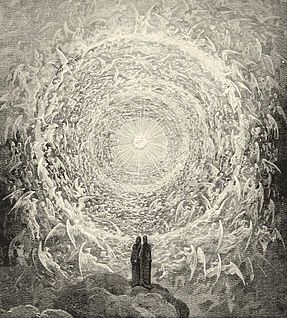
From a manuscript of mine:
The medieval Florentine poet Dante Alighieri (d. 1321), author of the immortal Divina Commedia, concludes his famous journey through the Inferno, Purgatory and Paradise, in the Empyrean, or tenth heaven, where, a lone mortal among immortals, he beholds the “Eternal Light.” He is overwhelmed, and, later, professes to have forgotten most of what he briefly knew.
. . . [M]y sight, becoming pure, was able
to penetrate the ray of Light more deeply—
that Light, sublime, which in Itself is true.
From that point on, what I could see was greater
than speech can show: at such a sight, it fails—
and memory fails when faced with such excess.
As one who sees within a dream, and, later,
the passion that had been imprinted stays,
but nothing of the rest returns to mind,
such am I, for my vision almost fades
Completely, yet it still distills within
my heart the sweetness that was born of it. . . .
In its profundity I saw—ingathered
and bound by love into one single volume—
what, in the universe, seems separate, scattered:
substances, accidents, and dispositions
as if conjoined—in such a way that what
I tell is only rudimentary.[1]
Unfortunately, though, while, for a brief and precious moment everything seemed to make sense and to fit together into a seamless whole, and while traces linger of the joy, love, and satisfaction that the poet felt, standing in that all-comprehending and all-explaining light, it now seems, Dante says, as if more than twenty-five centuries have passed.[2] All is vague, and exceedingly difficult to recall. Accordingly, the poet prays for divine assistance to bring back to his memory what he once knew, so that he can convey it to his readers:
O Highest Light, You, raised so far above
the minds of mortals, to my memory
give back something of Your epiphany,
and make my tongue so powerful that I
may leave to people of the future one
gleam of the glory that is Yours, for by
returning somewhat to my memory
and echoing awhile within these lines,
Your victory will be more understood.[3]
But his request is not granted. As a consequence, he reports,
What little I recall is to be told.
from this point on, in words more weak than those
of one whose infant tongue still bathes at the breast, . . .
How incomplete is speech, how weak, when set
Against my thought! And this, to what I saw
Is such—to call it little is too much.[4]
The Divine Comedy, of course, is poetic fiction. But Dante’s portrayal of his encounter with an intense light, full of love and intelligence, may be far more than merely a literary conceit.
[1] Allen Mandelbaum, trans., The Divine Comedy of Dante Alighieri: Paradiso (New York: Bantam Books, 1984), 299, 301 (canto 33, lines 52-63, 85-90). The original Italian, given on the facing pages (298, 300) of the Mandelbaum translation, reads as follows: “. . . la mia vista, venendo sincera, e più e più intrava per lo raggio de l’alta luce che da sé è vera. Da quinci innanzi il mio veder fu maggio che ‘l parlar mostra, ch’a tal vista cede, e cede la memoria a tanto oltraggio. Qual è colüi che sognando vede, che dopo ‘l sogno la passione impressa rimane, e l’altro a la mente non riede, cotal son io, ché quasi tutta cessa mia visïone, e ancor mi distilla nel core il dolce che nacque da essa. . . . Nel suo profondo vidi che s’interna, legato con amore in un volume, ciò che per l’universo si squaderna: sustanze e accidenti e lor costume quasi conflati insieme, per tal modo che ciò ch’i’ dico è un semplice lume.”
[2] Dante, Paradiso 33:93-96.
[3] Mandelbaum, The Divine Comedy of Dante Alighieri: Paradiso, 299, 301, (33:67-75). The Italian original, on pages 298, 300, reads: “O soma luce che tanto ti levi da’ concetti mortali, a la mia mente represta un poco di quel che parevi, e fa la lingua mia tanto possente, ch’una favilla sol de la tua Gloria possa lasciare a la futura gente; ché, per tornare alquanto a mia memora e per sonare un poco in questi versi, più si conceparà di tua vittoria.”
[4] Mandelbaum, The Divine Comedy of Dante Alighieri: Paradiso, 301, 303 (33:106-108, 121-123). The Italian original, on pages 300, 302, reads: “Omai sarà più corta ma favella, pur a quell ch’io ricordo, che d’un fante che bagni ancor la lingua a la mammella. . . . Oh quanto è corto il dire e como fioco al mio concetto! e questo, a quell chi’i’ vidi, è tanto, che non basta a dicer ‘poco.’”
Posted from Victoria, British Columbia










